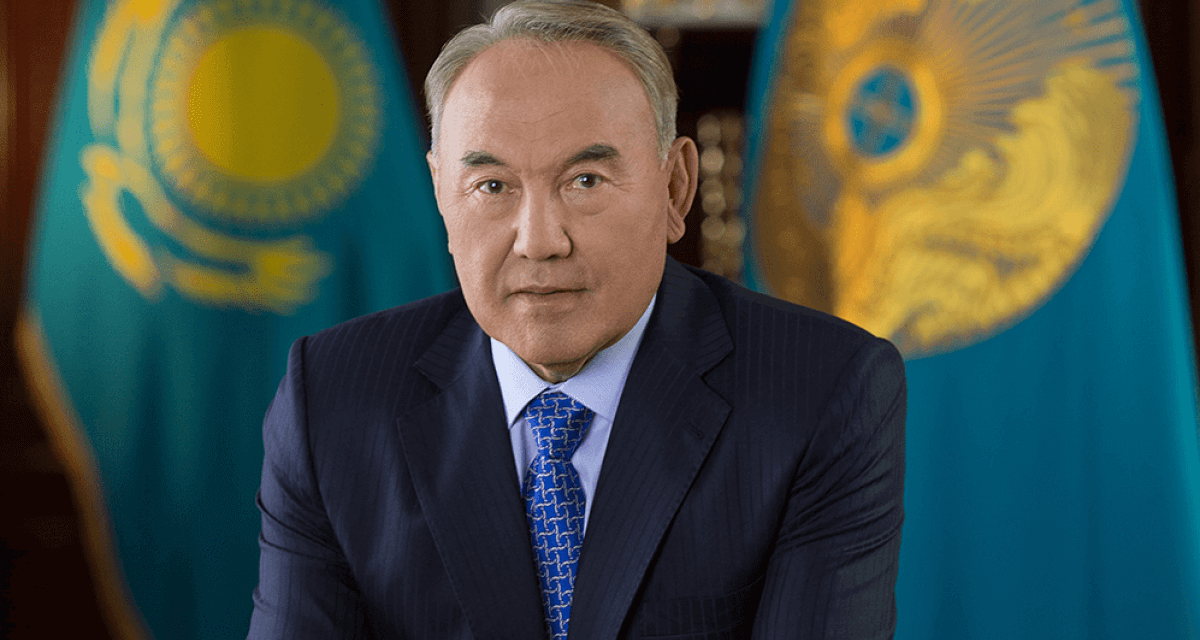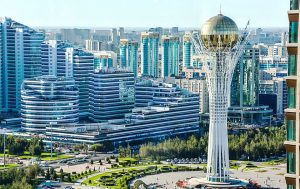Kazakhstan celebrates the Day of the First President of the Republic of Kazakhstan
The 1 of December, the day when citizens of our country celebrate a public holiday – the Day of the First President of the Republic of Kazakhstan Nursultan Nazarbayev. The celebration was initiated in December 2011 on the eve of the 20th anniversary of the independence of the Republic in recognition of the achievements of the Kazakh leader. It was on the day, December 1, 1991, when Nursultan Nazarbayev became the head of the young independent state, it was on this day that the institution of the presidency of the Republic of Kazakhstan was established, which had an undeniable impact on the entire course and development of the independent state.
Nursultan Nazarbayev described in detail his path as head of state, as well as the challenges faced by the Kazakh people after the collapse of the Soviet Union and look on the future in his book “The Era of Independence”, the Portuguese version of which was presented in March 2019 at the Ministry of Foreign Affairs of Brazil ( an electronic version is available https://www.gov.kz/memleket/entities/mfa-brazil/documents/details/40423?lang=pt-br).
As the current President of Kazakhstan Kassym-Jomart Tokayev notes in his article “Lessons from a Historical Personality”, the construction of an independent state, which is “one of the ten largest countries in the world, generously endowed with natural resources and had nuclear weapons inherited from the Soviet Union in its arsenal, was the very fate intended for the great son of his people, the founder of our state, the First President of Independent Kazakhstan – Elbasy Nursultan Nazarbayev”. The path of history is never simple and straightforward. Ups and downs, sharp turns are possible, and there are also numerous “amateurs” to criticize the era. But there are few individuals who can make bold decisions and act, who make history and lead into a new era. Among them is our First President, Elbasy Nursultan Nazarbayev, an outstanding statesman and a unique reformer, rightfully recognized and respected by the entire world community. Thanks to Elbasy, Kazakhstan has become an authoritative and successful member of the international community. It is to the phenomenon of Nursultan Nazarbayev that we owe the fact that in difficult times the unity and consent of the people was preserved, Kazakhstan moved to a market economy and became an active participant in global economic processes.
The country’s geographic location, sandwiched in the center of the continent between the major powers and the unstable south, determined the difficult geopolitical situation and limited economic opportunities. The volume of industrial production in Kazakhstan in 1990-1994 fell by half, transportation – by 2/3, agriculture – by 30%. Industrial giants of union importance in the coal, mining and other industries stopped. Unemployment grew, and massive economic migration
began. Kazakhstan had to overcome the existing ineffective economic model. In a country that aspired to a market economy, archaic mechanisms of management and organization of state institutions remained. It was important to preserve peace and harmony in a multi-ethnic society, which consists of more than 130 nationalities, professing more than 30 religious confessions. The task arose of building external relations with neighbors and large countries, it was necessary to look for their place in the world community. Young Kazakhstan went through all these hardships under the leadership of the First President. With the passage of time, it is obvious that during the period of uncertainty, the Kazakhstani leader managed not only to make bold decisions for his time, but also to unite the society in the crisis period and bring it to a new level of development. Nursultan Nazarbayev, having singled out certain universal principles of state building from world experience, was able to skillfully impose them on the national context and form his own development model. He presented the formula of state development “first – the economy, then – politics”, that is, initially the country made a bet on economic development, and on this basis – the development of democratic institutions.
The efforts of the First President of Kazakhstan were focused on the three stages of modernization initiated by him.
The first modernization – the beginning of the 1990s – then the task was to rebuild the public administration system, form the foundations of a market economy and integrate into the world community. Kazakhstan has chosen democracy as a model of political development, having carried out a “triple transit” in the economic, social and socio-political spheres. In 1993, the introduction of the national currency tenge into circulation became significant. On the basis of the new Constitution in 1995, a political system was created with the separation of the executive, legislative and judicial powers, and the foundation of the rule of law was laid. Kazakhstan declared itself as a state oriented towards peaceful development, and gave up the fourth most powerful nuclear arsenal inherited from the Union State. The decree on the closure of the Semipalatinsk nuclear test site is a step that brought worldwide recognition to Nursultan Nazarbayev. In 1997, having presented to the public the Development Strategy until 2030 with a detailed action plan for all spheres of life, he directed the country to look ahead.
The second modernization started in the third quarter of the 1990s and ended in the mid-2010s. Under the leadership of Nursultan Nazarbayev, the economy entered the trajectory of sustainable growth, a modern system of state institutions and a middle class were formed in the country. The quality of life has noticeably improved, if at the beginning of the 1990s GDP per capita was $ 700, then by 2013 this figure had already reached $ 12,000. The World Bank has included Kazakhstan in the number of middle income countries. The state passed through two world economic crises of 1998 and 2008-2009 without tangible losses. A major successful achievement of the
republic at that time was the transfer and construction of the new capital of the state – Astana, which last year was renamed Nur-Sultan in honor of the author of this initiative. The new administrative center of the country has solved a whole range of strategic tasks of state development and has become a symbol of a new historical era. In 2012, Kazakhstan became one of the 50 most competitive countries in the world. In the same years, in the Strategy “Kazakhstan-2050” Nursultan Nazarbayev presented a new ambitious development goal – to take a place among the 30 advanced countries of the world. Thanks to the First and Second modernizations, the tasks of dismantling the totalitarian system and building a market economy, early entry into the top 50 most competitive countries of the world were successfully solved.
The third modernization, announced by the First President in 2017, is aimed at renewing the country and moving it into 30 prosperous states in a new global reality. Thanks to the current policy, Kazakhstan’s GDP grew from $ 22 billion to $ 184 billion. Efforts to develop business activity led the country to rise from 86th place in 2005 to 25th position in 2019 in the international Doing Business ranking.
On March 20, 2019, Nursultan Nazarbayev resigned as President of the Republic of Kazakhstan at his own request, noting that the Speaker of the Senate Kassym-Jomart Tokayev would be the acting head of state. In his address to the people, he said: “I have made the decision to end my powers as President. This year marks the 30th anniversary of my holding the highest post. The people gave me the opportunity to be the first president of independent Kazakhstan”. The first President, Elbasy Nursultan Nazarbayev retained the post of head of the country’s Security Council, member of the Constitutional Council of Kazakhstan and chairman of the Nur Otan party.
The results of the presidential elections held on June 9, 2019 and the victory of Kassym-Jomart Tokayev became a positive strong signal for the entire world community that Kazakhstan is a democratic, peaceful and stable country. The elections confirmed that our country is focused on justice, progress and continuity of domestic and foreign policy.
A stable state system and a strong presidential power made it possible to carry out a deep reform of the country, which is going through a stage of global competition for a place among the most developed countries. At the initiative of the President of Kazakhstan Kassym-Jomart Tokayev, modernization measures are being implemented today aimed at strengthening the efficiency of the public administration system, economic development in new realities, unlocking industrial potential, developing agriculture, raising the level of the transport and logistics complex, supporting small and medium-sized businesses, promoting the system health care, balanced territorial development, improving the social well-being of Kazakhstanis, increasing the role of ecology and protecting biodiversity, building a
fair state on protecting the interests of citizens, increasing the degree of digitalization of the country and civil participation in government. These measures are especially relevant during the fight against the coronavirus pandemic and the global economic crisis, and they will also help to successfully overcome the difficult situation in the country.
The creation of their own state is a turning point in the thousand-year history of the people who from time immemorial controlled the vast expanses of Central Eurasia. As a result of multidirectional reforms under the leadership of the First President of Kazakhstan, the country managed to make a “leap in time”, without hesitation moved from the Soviet political, economic and historical era to a new one – to the milestone of Independent Kazakhstan. Elbasy is the founder of our state, a symbol of the unity of the people, a person who stands at the origins of the history of independent Kazakhstan!
Embassy of Kazakhstan to Brazil
Portuguese:
O Cazaquistão celebra o Dia do Primeiro Presidente da República
1 de dezembro deste ano os cidadãos de nosso país celebram um feriado – o Dia do Primeiro Presidente da República do Cazaquistão Nursultan Nazarbayev. A celebração foi iniciada em dezembro de 2011, na véspera do 20º aniversário da independência da república, em reconhecimento às conquistas do líder cazaque. Foi neste dia, 01 de dezembro de 1991, que Nursultan Nazarbayev se tornou o chefe de um jovem estado independente, foi neste dia que a instituição da presidência da República do Cazaquistão foi estabelecida, que teve uma influência inegável em todo o curso e desenvolvimento do estado independente.
Nursultan Nazarbayev descreveu sua trajetória como chefe de estado, bem como os desafios enfrentados pelo povo cazaque após o colapso da União Soviética e suas perspectivas sobre o futuro, em seu livro “A Era da Independência”, cuja versão em português foi apresentada em março de 2019 dentro das paredes do Itamaraty ( uma versão eletrônica está disponível https://www.gov.kz/memleket/entities/mfa-brazil/documents/details/40423?lang=pt-br).
Como o atual presidente do Cazaquistão Kassym-Jomart Tokayev observa em seu artigo “Lições de uma personalidade histórica”, a construção de um estado independente, que é “um dos dez maiores estados do mundo, generosamente dotado de recursos naturais e com armas nucleares herdadas da União Soviética em seu arsenal, foi o próprio destino destinado ao grande filho de seu povo, o fundador de nosso estado, o Primeiro Presidente do Cazaquistão independente – Elbasy Nursultan Nazarbayev ”. O caminho da história nunca é simples e direto. Subidas e descidas, curvas fechadas são possíveis, e também há inúmeros “amadores” para criticar a época. Mas existem poucos indivíduos que podem tomar decisões ousadas e agir, que fazem história e
conduzem a uma nova era. Entre eles está nosso Primeiro Presidente, Elbasy Nursultan Nazarbayev, um notável estadista e um reformador único, legitimamente reconhecido e respeitado por toda a comunidade mundial. Graças a Elbasy, o Cazaquistão se tornou um membro autorizado e bem-sucedido da comunidade internacional. É ao fenômeno de Nursultan Nazarbayev que devemos o fato de que, em tempos difíceis, a unidade e o consentimento do povo foram preservados, o Cazaquistão mudou-se para uma economia de mercado e tornou-se um participante ativo nos processos econômicos globais.
A localização geográfica do país, espremido no meio do continente entre as grandes potências e o sul instável, determinou uma situação geopolítica difícil e oportunidades econômicas limitadas. O volume da produção industrial no Cazaquistão em 1990-1994 caiu pela metade, transporte – em 2/3, agricultura – em 30%. Os gigantes industriais de importância sindical nas indústrias de carvão, mineração e outras indústrias pararam. O desemprego cresceu e começou a migração econômica em massa. O Cazaquistão teve que superar o modelo econômico ineficaz existente. Em um país que aspirava a uma economia de mercado, permaneceram os mecanismos arcaicos de gestão e organização das instituições estatais. Era importante preservar a paz e a harmonia em uma sociedade multiétnica, que consiste em mais de 130 nacionalidades, professando mais de 30 confissões religiosas. A tarefa surgiu de construir relações externas com vizinhos e grandes países, era necessário buscar o seu lugar na comunidade mundial. O jovem Cazaquistão passou por todas essas dificuldades sob a liderança do Primeiro Presidente. Com o passar do tempo, é óbvio que durante o período de incertezas, o líder do Cazaquistão conseguiu não só tomar decisões ousadas para o seu tempo, mas também unir a sociedade no período de crise e levá-la a um novo patamar de desenvolvimento. Nursultan Nazarbayev, tendo destacado certos princípios universais de construção do estado da experiência mundial, foi capaz de impô-los habilmente no contexto nacional e formar seu próprio modelo de desenvolvimento. Ele apresentou a fórmula do desenvolvimento do Estado “primeiro – a economia, depois – a política”, ou seja, inicialmente o país apostou no desenvolvimento econômico, e nesta base – o desenvolvimento das instituições democráticas.
Os esforços do Primeiro Presidente do Cazaquistão se concentraram nas três etapas de modernização iniciadas por ele.
A primeira modernização – início da década de 1990 – então a tarefa era reconstruir o sistema de administração pública, formar as bases de uma economia de mercado e integrar-se à comunidade mundial. O Cazaquistão escolheu a democracia como modelo de desenvolvimento político, tendo realizado um “trânsito triplo” nas esferas econômica, social e sócio-política. Em 1993, a introdução da moeda nacional tenge em circulação tornou-se significativa. Com base na nova Constituição de 1995, foi criado um sistema político com a separação dos poderes executivo, legislativo e judicial, e foram lançados os alicerces do Estado de direito. O Cazaquistão se declarou um Estado voltado para o desenvolvimento pacífico e desistiu do quarto arsenal nuclear mais poderoso herdado do Estado-União. O decreto sobre o fechamento do local de testes nucleares de Semipalatinsk é uma medida que trouxe reconhecimento mundial para Nursultan Nazarbayev. Em 1997, tendo apresentado ao público a Estratégia de Desenvolvimento até 2030 com um plano de ação detalhado para todas as esferas da vida, ele orientou o país a olhar para frente.
A segunda modernização começou no terceiro trimestre da década de 1990 e terminou em meados da década de 2010. Sob a liderança de Nursultan Nazarbayev, a economia entrou na trajetória de crescimento sustentável, um sistema moderno de instituições estatais e uma classe média foram formados no país. A qualidade de vida melhorou sensivelmente, se no início da década de 1990 o PIB per capita era de $ 700, então em 2013 esse número já havia chegado a $ 12.000. O Banco Mundial incluiu o Cazaquistão no número de países de renda média. O estado passou por duas crises econômicas mundiais de 1998 e 2008-2009 sem perdas tangíveis. Uma grande conquista da república naquela época foi a transferência e construção da nova capital do estado – Astana, que foi rebatizada de Nur-Sultan no ano passado em homenagem ao autor desta iniciativa. O novo centro administrativo do país resolveu toda uma série de tarefas estratégicas de desenvolvimento do Estado e se tornou um símbolo de uma nova era histórica. Em 2012, o Cazaquistão se tornou um dos 50 países mais competitivos do mundo. Nos mesmos anos, na Estratégia “Cazaquistão-2050”, Nursultan Nazarbayev apresentou uma nova e ambiciosa meta de desenvolvimento – ocupar um lugar entre os 30 países avançados do mundo. Graças à Primeira e à Segunda Modernizações, as tarefas de desmantelar o sistema totalitário e construir uma economia de mercado, a entrada antecipada nos 50 países mais competitivos do mundo foram resolvidas com sucesso.
A terceira modernização, anunciada pelo Primeiro Presidente em 2017, visa renovar o país e colocá-lo em 30 estados prósperos em uma nova realidade global. Graças à política atual, o PIB do Cazaquistão cresceu de US $ 22 bilhões para US $ 184 bilhões. Os esforços para desenvolver a atividade empresarial levaram o país a
passar da 86ª posição em 2005 para a 25ª posição em 2019 no ranking internacional de Doing Business.
Em 20 de março de 2019, Nursultan Nazarbayev renunciou ao cargo de Presidente da República do Cazaquistão a seu próprio pedido, observando que o presidente do Senado Kassym-Jomart Tokayev seria o chefe de estado interino. Em seu discurso ao povo, ele disse: “Tomei a decisão de encerrar meus poderes como Presidente. Este ano marca o 30º aniversário do meu cargo mais alto. As pessoas me deram a oportunidade de ser o primeiro presidente do Cazaquistão independente ”. O primeiro presidente, Elbasy Nursultan Nazarbayev, manteve o cargo de chefe do Conselho de Segurança do país, membro do Conselho Constitucional do Cazaquistão e presidente do partido Nur Otan.
Os resultados das eleições presidenciais realizadas em 9 de junho de 2019 e a vitória de Kassym-Jomart Tokayev tornaram-se um forte sinal positivo para toda a comunidade mundial de que o Cazaquistão é um país democrático, pacífico e estável. As eleições confirmaram que o nosso país está focado na justiça, no progresso e na continuidade da política interna e externa.
Um sistema de Estados estável e um forte poder presidencialista possibilitaram uma profunda reforma do país, que atravessa uma fase de competição global por uma vaga entre os países mais desenvolvidos. Por iniciativa do Presidente do Cazaquistão Kassym-Jomart Tokayev, medidas de modernização estão sendo implementadas hoje com o objetivo de fortalecer a eficiência do sistema de administração pública, desenvolvimento econômico em novas realidades, desbloquear o potencial industrial, desenvolver a agricultura, elevar o nível do complexo de transporte e logística, apoiar pequenas e médias empresas, promover o sistema cuidados de saúde, desenvolvimento territorial equilibrado, melhoria do bem-estar social dos Cazaquistão, aumento do papel da ecologia e proteção da biodiversidade, construção de um estado justo na proteção dos interesses dos cidadãos, aumento do grau de digitalização do país e participação civil no governo. Essas medidas são especialmente relevantes durante a luta contra a pandemia do coronavírus e a crise econômica global, e também ajudarão a superar com sucesso a difícil situação no país.
A criação do seu próprio estado é um ponto de viragem na história milenar do povo, que desde tempos imemoriais controlou as vastas extensões da Eurásia Central. Como resultado de reformas multidirecionais sob a liderança do Primeiro Presidente do Cazaquistão, o país conseguiu dar um “salto no tempo”, sem hesitação passou da era política, econômica e histórica soviética para uma nova – para o marco do Cazaquistão Independente. Elbasy é o fundador do nosso estado, um símbolo da unidade do povo, uma pessoa que está nas origens da história do Cazaquistão independente!
Embaixada do Cazaquistão no Brasil
THE GUIDE informs:
We highly recommend Dr. Tamara Passos as a doctor specialized in Family Medicine and able to provide assistance to members of the diplomatic corps in Brasilia, in the English, Spanish, and Portuguese languages.
With over 15 years’ experience, Dr. Passos can attend to you and your family in the comfort of your home.
Visit https://theguide.com.br/services/doctor-tamara-passos/ and learn more about family medicine and the experience of Dr. Tamara Passos.
Dr. TAMARA PASSOS
(CRM-DF 20.174)
Phone and WhatsApp: (61) 99832-4782
The diplomatic corps publications in this page are free of charge.
We kindly request the members of the diplomatic corps to send the texts in English and Portuguese, in Word format, to the email: pedro@theguide.com.br. You can also send an image in jpeg format related to the text.









